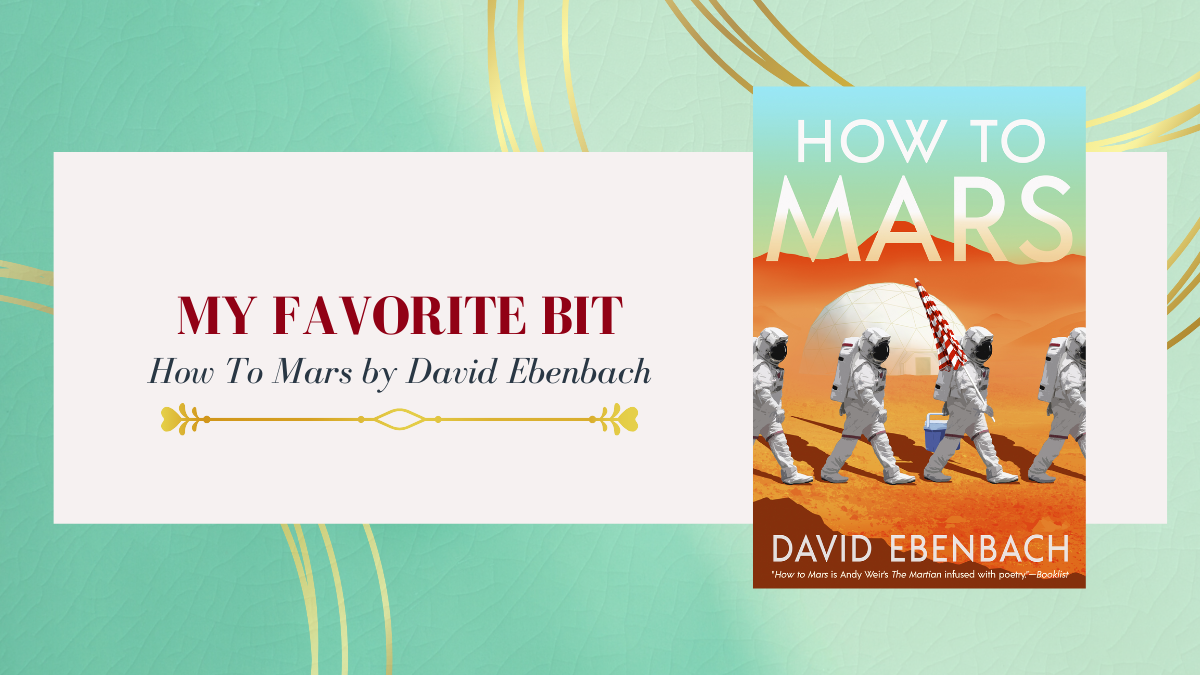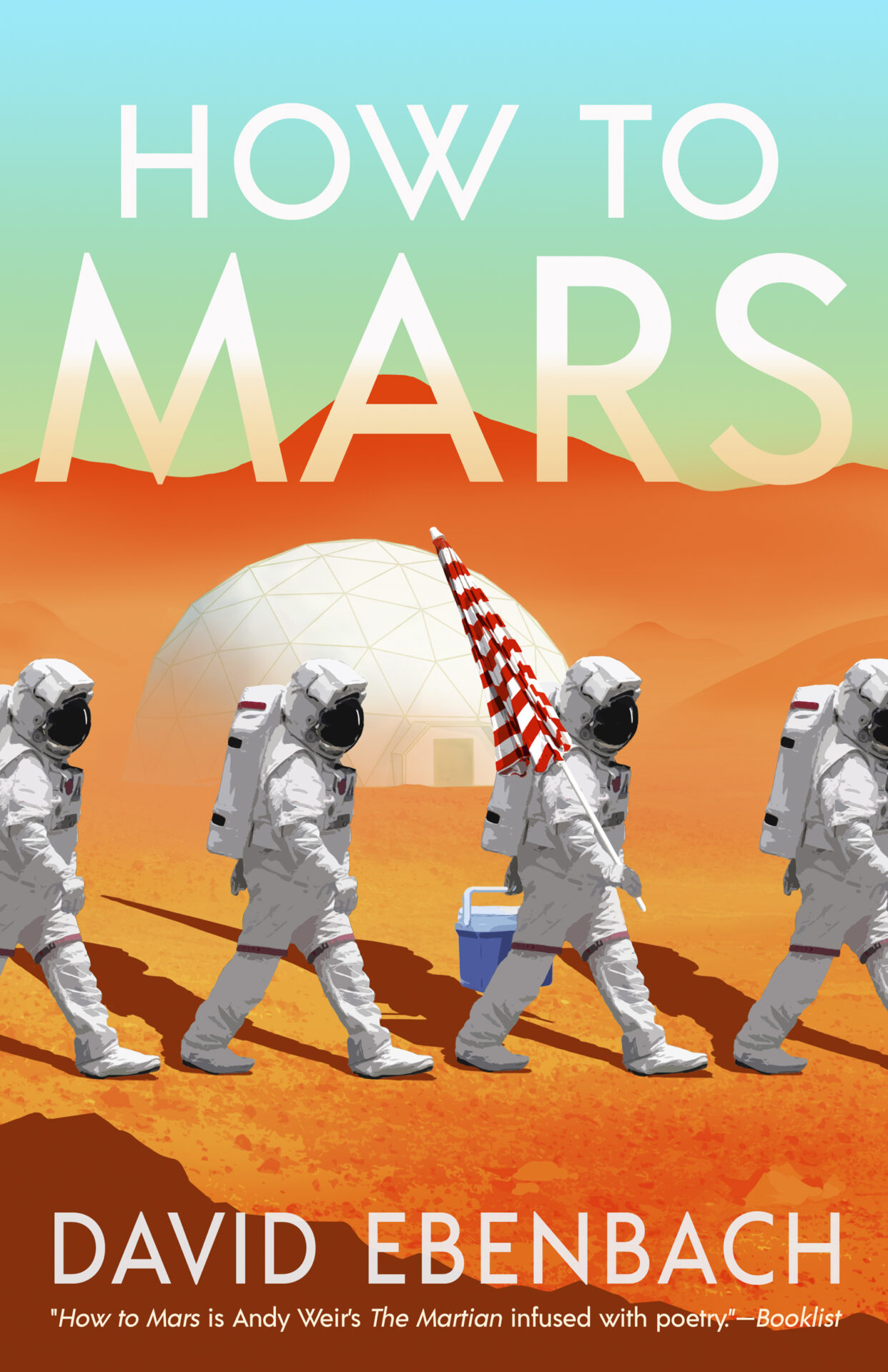
David Ebenbach is joining us today to talk about his novel, How To Mars. Here’s the publisher’s description:
What happens when your dream mission to Mars is a reality television nightmare? This debut science-fiction romp with heart that follows the tradition of Ray Bradbury’s Martian Chronicles, with a hints of the Hitchhiker’s Guide to the Galaxy, the Real World, and Mythbusters.
For the six lucky scientists selected by the Destination Mars! corporation, a one-way ticket to Mars―in exchange for a lifetime of research―was an absolute no-brainer. The incredible opportunity was clearly worth even the most absurdly tedious screening process. Perhaps worth following the strange protocols in a nonsensical handbook written by an eccentric billionaire. Possibly even worth their constant surveillance, the video of which is carefully edited into a ratings-bonanza back on Earth.But it turns out that after a while even scientists can get bored of science. Tempers begin to fray; unsanctioned affairs blossom. When perfectly good equipment begins to fail, the Marsonauts are faced with a possibility that their training just cannot explain.
Irreverent, poignant, and perfectly weird, David Ebenbach’s exciting debut science-fiction outing, like a mission to Mars, is an incredible trip you will never forget.
What’s David’s favorite bit?

DAVID EBENBACH
I have a weakness for allegory. And I mean that in more than one way—a weakness in that I love a good allegory, and a weakness in that my love for a good allegory has gotten me in trouble in the past. More than once I have ruined a piece of fiction by trying to force it to echo a bigger idea. In those instances I didn’t get to know the characters for their own sake, didn’t let the story develop for its own sake—instead I focused (way too much) on what those characters and that story were supposed to represent.
But in my new novel, How to Mars, I think I may have finally gotten away with an allegory.
The way I like to describe my book is this: How to Mars is, on one level, about a not-totally-well-conceived one-way mission to Mars; on another level, it’s about how any of us, on any planet, are supposed to live our lives in this complicated, confusing universe. And, as to that second level, one narrative I thought about a lot as I was writing was the Garden of Eden story—or, rather, the part of that story where people are kicked out of the Garden and have to make their way as best they can, here and there hearing from G-d in the form of mysterious observations, guidance, and commandments. (And sometimes plagues.) It’s a powerful and archetypal story—one that I think says a lot about the struggles we all face trying to live in uncertainty.
There are a lot of intentional parallels between that story and mine. In How to Mars, the word “garden” is associated with planet Earth eleven times; my Marsonauts are no longer in that garden, and have to make their way as best they can. And they, like the post-Garden humans in the Bible, receive mysterious observations, guidance, and even one commandment, all collected in a handbook handed down by a powerful source—the organization that sent them to Mars. (There’s also one minor plague.) And, along the same lines as Adam and Eve starting a family as soon as they’re outside Eden, my novel begins “This is how I find out Jenny is pregnant on Mars.”
There are plenty more parallels in the novel, but here’s the important thing: I was very determined not to force the allegory. First of all, my two main characters are named Jenny and Josh, not Adam and Eve. And in no way did I attempt to make the plot of my novel follow the Biblical plot step by step; instead I just made connections, where it made sense to do so, to broad themes and big moments in that story. The result, I think, is that the Biblical narrative informs the novel, quietly but consistently, without controlling it.
I mean, it must be quiet; so far not one interviewer or reviewer has pointed out the allegory. And this despite the fact that, at one point, the Mars handbook says, “Wouldn’t it be funny if this handbook, unofficial as it is, became something like a Bible for your new religion?” At another point, it reads, “You’re like the proverbial first humans outside the proverbial Garden of Eden!” So I did leave some bread crumbs, or even big chunks of bread.
But I’m glad if the allegory is passing by somewhat unnoticed. I’m glad because it means I didn’t overdo it, which has too often been my downfall in the past. I wasn’t, after all, trying to make some BIG POINT with my allegory; I was simply leaning on a story so old that it’s in the bones for many of us, hoping to gain a little strength and wisdom through the leaning. And for anybody who spotted the allegory (before reading this!): bonus points to you.
LINKS:
How To Mars Universal Book Link
BIO:
David Ebenbach writes. He’s been writing ever since he was a kid, when he kept his whole family awake by banging away on an enormous manual typewriter, and he’s never wanted to stop. He is the author of eight books of fiction, poetry, and non-fiction, and his work has picked up awards along the way: the Drue Heinz Literature Prize, the Juniper Prize, the Patricia Bibby Award, and more.
A Philadelphia native, these days David does most of his writing in Washington, DC, where he lives with his family—because he uses a laptop now, he doesn’t keep them awake with his typing—and where he works at Georgetown University, teaching creative writing and literature.
